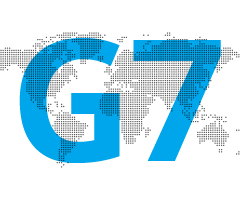
The G7 is a group of seven advanced economies: Canada, France, Germany, Italy, Japan, the United Kingdom, and the United States of America. The EU also participates in the work of the G7 as an invitee.
Links
https://www.elysee.fr/admin/upload/default/0001/05/62a9221e66987d4e0d6ffcb058f3d2c649fc6d9d.pdf
https://www.mofa.go.jp/files/000373837.pdf
http://www.g8.utoronto.ca/employment/2018-labour-annex-b-en.html
ARTIFICIAL INTELLIGENCE
Artificial intelligence (AI) and its implications for the economy and society have featured on the G7 agenda in recent years. In 2017, G7 ICT and industry ministers adopted a Declaration on Making the Next Production Revolution Inclusive, Open and Secure, in which they underlined the need for a human-centric approach to AI. Building on this declaration, in 2018 the G7 innovation ministers issued a Statement on Artificial Intelligence, expressing their support for the common vision of human-centric AI and emphasising the need for governments to support economic growth from AI innovation, encourage trust in and the adoption of AI, and promote inclusivity in AI development and deployment.
At their 2018 summit in Charlevoix, France, G7 leaders adopted a Common Vision for the Future of Artificial Intelligence, outlining a series of commitments related to promoting human-centric AI and the commercial adoption of AI; promoting investment in AI research and development; promoting trust in the development and adoption of AI systems; promoting active labour market policies, workforce development, and reskilling programmes; and encouraging initiatives to promote digital security in AI, among others.
One lear later, in 2019, G7 leaders together with Australia, Chile, India, South Africa, and the Organisation for Economic Co-operation and Development (OECD) adopted the Biarritz Strategy for an Open, Free and Secure Digital Transformation, noting the need to support and guide the responsible development of AI that is grounded in human rights, inclusion, diversity, innovation, and economic growth. The strategy also refers to international co-operation on AI-related issues, as the signatory leaders commit to share multidisciplinary research results on AI issues and best practice, and bring together international AI initiatives.
In addition to facilitating intergovernmental dialogue and co-operation on AI-related issues, the G7 also promotes multistakeholder discussions, as illustrated by the 2018 Multistakeholder Conference on Enabling the Responsible Adoption of AI.
BLOCKCHAIN
Crypto-assets and digital currencies have featured a topic on the G7 agenda over the past couple of years, as countries start to explore the potential benefits and risks of such instruments.
At their June 2018 meeting, finance ministers and central bank governors noted that crypto-assets and associated technologies have the potential to make the financial sector more efficient, but they may also raise issues related to investor protection, market integrity, and illicit transactions. As such, they expressed support for international coordination in ensuring that regulatory actions are effective in the globally interconnected financial system.
In 2019, G7 created a Working Group on Stablecoins, to examine the risks and opportunities associated with these instruments. The group issued its first report in October 2019, noting that, at the national level, stablecoins pose legal, regulatory, and oversight challenges and risks related to consumer and investor protection, data privacy and protection, market integrity, safety and integrity of payment systems, and money laundering and terrorist financing, among others. If they reach global scale, stablecoins could also pose risks to monetary policy, financial stability, and the international monetary system. In this context, the group presented a series of recommendations for central banks, finance ministers, standard-setting bodies, and relevant international organisations, encouraging them to ‘support responsible innovation in payments while ensuring a globally consistent response to mitigating risks’.
In a follow-up to this report, finance ministers and central bank governors noted that ‘no global stablecoin project should begin operation until the legal, regulatory and oversight challenges and risks are adequately addressed, through appropriate designs and by adhering to regulation that is clear and proportionate to the risks.’
ARTIFICIAL INTELLIGENCE
- Acknowledges the need to support and guide the responsible development of AI that is grounded in human rights, inclusion, diversity, innovation, and economic growth.
BLOCKCHAIN
- Thinks that crypto-assets and stablecoins could pose risks in particular to monetary policy and financial stability, and that such risks should be carefully addressed before such instruments begin operation.